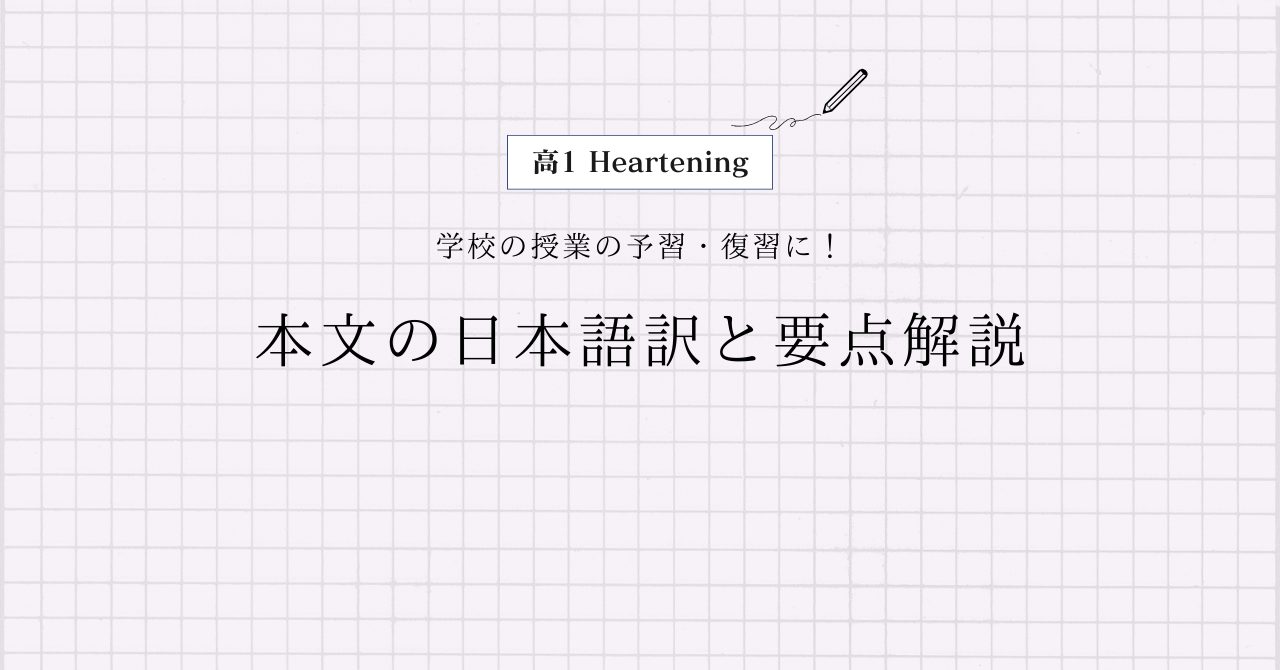桐原書店 高1Heartening Lesson7 Section2の本文の日本語訳と重要箇所の解説です。
Lesson7-1, 7-3, 7-4の解説はこちらからご覧ください。
>高1Heartening Lesson7 Section1 本文和訳
>高1Heartening Lesson7 Section3 本文和訳
>高1Heartening Lesson7 Section4 本文和訳
- Heartening Lesson7 Section2 本文と日本語訳
- Heartening Lesson7 Section2 重要事項の解説
- You may see people at a factory in Bangladesh working in harsh conditions.
- A 24-year-old woman named Shilpy has been working in a garment factory for ten years.
- She has no choice but to work there to raise her two daughters, since her husband is sick and cannot work.
- She keeps working at the sewing machine for eight hours a day.
- There is no air-conditioning, and in summer it reaches 40°C with high humidity.
- These conditions are harmful to workers’ health.
- The situation is more awful than you could possibly imagine.
- Sometimes terrible accidents occur in garment factories in Bangladesh.
- In 2013, a factory building collapsed because the factory’s owner left the building neglected for a long time.
- A thousand people were killed in the accident.
- The disaster is considered to be one of the worst industrial tragedies in history.
- These are the facts behind the low prices of cheaply manufactured clothes.
- Knowing these facts, would you want to buy a cheap polo shirt from Bangladesh?
- Heartening Lesson7 Section2 まとめ
Heartening Lesson7 Section2 本文と日本語訳
You may see people at a factory in Bangladesh working in harsh conditions.
「バングラデシュの工場で、厳しい状況の中で働いている人々を見るかもしれません。」
A 24-year-old woman named Shilpy has been working in a garment factory for ten years.
「Shilpyという名前の24歳の女性は10年間衣料品工場で働き続けています。」
She has no choice but to work there to raise her two daughters, since her husband is sick and cannot work.
「彼女の夫は病気で働くことができないので、2人の娘を育てるためにそこで働く以外の選択肢がありません。」
She keeps working at the sewing machine for eight hours a day.
「彼女は1日に8時間、ミシンで作業をし続けます。」
There is no air-conditioning, and in summer it reaches 40°C with high humidity.
「エアコンはなく、夏には湿度が高く、40℃に達します。」
These conditions are harmful to workers’ health.
「こういった状況は労働者の健康に害を及ぼします。」
The situation is more awful than you could possibly imagine.
「その状況は、あなたがおそらく想像するよりも酷いです。」
Sometimes terrible accidents occur in garment factories in Bangladesh.
「時に、バングラデシュの衣料品工場で恐ろしい事故が起きます。」
In 2013, a factory building collapsed because the factory’s owner left the building neglected for a long time.
「2013年、工場主が長期間工場のビルを放置していたので、それが倒壊しました。」
A thousand people were killed in the accident.
「その事故で1,000人が亡くなりました。」
The disaster is considered to be one of the worst industrial tragedies in history.
「その大惨事は、歴史上における最悪な工場の悲劇の1つとされています。」
These are the facts behind the low prices of cheaply manufactured clothes.
「これらは、安く作られる服の低い価格の裏にある事実です。」
Knowing these facts, would you want to buy a cheap polo shirt from Bangladesh?
「こういった事実を知って、あなたはバングラデシュの安いポロシャツを買いたいと思いますか?」

Heartening Lesson7 Section2 重要事項の解説
You may see people at a factory in Bangladesh working in harsh conditions.
“may”は「かもしれない」という助動詞ですね。
“factory”は「工場」、“Bangladesh”は「バングラデシュ」、“condition”は「状況、状態」といった名詞になります。
“work”は「働く、取り組む」という動詞で、ここでは「現在分詞」となり、“working in harsh conditions”が“people at a factory in Bangladesh”を修飾しています。
“harsh”は「厳しい、辛辣な」という形容詞です。
A 24-year-old woman named Shilpy has been working in a garment factory for ten years.
“数字 – 単位”で1つの形容詞をつくることができます。このとき「単位」は単数形にします。
“name”は「を名付ける」という動詞で、ここでは「過去分詞」となり、“named Shilpy”が“A 24-year-old woman”を修飾しています。
また、この文は「現在完了進行形」にもなっていますね。
“garment”は「衣類、衣服」という名詞で、“for 数字”は「~間」という重要表現です。
She has no choice but to work there to raise her two daughters, since her husband is sick and cannot work.
“have no choice but to 動詞の原形”は「~する以外の選択肢がない、~するほかない」といった重要表現です。
“raise”は「を育てる、を上げる」という動詞で、ここでは「不定詞の副詞的用法」になっていますね。
“daughter”は「娘」という名詞です。
この“since”は「~ので」という理由を表す接続詞です。“because”や“as”と同じですね。
“husband”は「夫」という名詞、“sick”は「病気の、体調が悪い」という形容詞になります。
She keeps working at the sewing machine for eight hours a day.
“keep -ing”は「~し続ける」という重要表現です。“keep on -ing”でもOKです。
“sewing machine”は「ミシン」という名詞ですね。
「年に〇回」など,特定の期間に〇回という表現をする場合は,“回数 a 期間”の形で表します。
「年/月/週/日 に 1/2/3回」=”once/twice/three times a year/month/week/day“
3回目以降は”数字 times”と表現します。
There is no air-conditioning, and in summer it reaches 40°C with high humidity.
ここでは「there構文」が使われていますね。
“There is(are) no 名詞”は「~が(1つも)ない」という否定の意味です。可算名詞のときは名詞を複数形にして“are”、不可算名詞のときは“is”を使います。
“air-conditioning”は「エアコン、空調」という不可算名詞です。
天候や気温などを表現するときは“it”を使いますね。特に訳す必要はありません。
“reach”は「に達する、着く、届く」といった動詞で、“high”は「高い」という形容詞、“humidity”は「湿度」という名詞になります。
“with”は前置詞で「~と一緒に」と訳すことが多いですが,必ずしも後ろに人が来るわけではありません。イメージとして「~とセットで」と覚えておきましょう。
These conditions are harmful to workers’ health.
“these”は“this”の複数形で,「これらは(の)」といった意味になります。
“harmful”は「有害な、害のある」という形容詞で、“harmful to~”で「~に害がある」という表現です。
“worker”は「労働者」、“health”は「健康」という名詞ですね。
名詞に‘sを付けると「~の」という所有を表します。
直前の名詞が複数形のときは” teachers‘ “のようにアポストロフィーだけを最後に付けます。
The situation is more awful than you could possibly imagine.
“situation”は「状況、状態」という名詞で、“awful”は「ひどい、大変な」という形容詞です。ここでは「比較級」になっていますね。
この“could”は“can”の過去形ではなく、「~だろう」という推量の意味になります。“can”よりも可能性の程度が低いことを意味しますよ。
“possibly”は「多分、ひょっとしたら」といった副詞で、“imagine”は「を想像する」という動詞です。
Sometimes terrible accidents occur in garment factories in Bangladesh.
“sometimes”は「時々」という副詞です。
“terrible”は「ひどく悪い、恐ろしい」という形容詞で、“accident”は「事故」という名詞になります。
“occur”は「起きる」という動詞ですね。
In 2013, a factory building collapsed because the factory’s owner left the building neglected for a long time.
“building”は「ビル、建物」という名詞で、“collapse”は「倒壊する、つぶれる」という動詞です。
“owner”は「所有者、オーナー」という名詞で、“left”は“leave”の過去形ですね。
“leave 名詞 形容詞/名詞”で「名詞を~のままにする」という重要表現になります。
“neglected”は「放っておかれた、無視された」という形容詞で、“for a long time”は「長期間」という表現ですね。
A thousand people were killed in the accident.
“thousand”は「千(の)」という意味です。
“kill”は「を殺す」という動詞で、“be killed in~”は「~で死ぬ」という重要な受動態表現になります。
The disaster is considered to be one of the worst industrial tragedies in history.
“disaster”は「大惨事、災害」、“tragedy”は「悲劇、惨事」という名詞で、“consider”は「を考慮する、と認める」といった動詞です。
“be considered to be~”で「~であるとみなす、考える」という重要な受動態表現になります。
“one of the 最上級 名詞の複数形”は「最も~な名詞の1つ」という「比較の応用表現」ですね。
“worst”は“bad(悪い)”の「最上級」で、“industrial”は「工業の、産業の」という形容詞、“in history”は「歴史上で」という表現になります。
These are the facts behind the low prices of cheaply manufactured clothes.
“fact”は「事実」という名詞で、“behind”は「~の裏側に、後ろに」という前置詞になります。
“low”は「低い」という形容詞、“price”は「価格」という名詞です。
“of”は前置詞で,”A of B”の形で「BのA」というように後ろから前に訳します。
“cheaply”は「安く、手軽に」という副詞、“manufacture”は「を作る、製造する」という動詞、“clothes”は「服」という名詞になります。
また、“manufactured”は「過去分詞」で、“manufactured”が後ろの“clothes”を修飾しています。
Knowing these facts, would you want to buy a cheap polo shirt from Bangladesh?
“Knowing these facts”は「分詞構文」になっています。
元々は“When you know these facts,~”で、接続詞“when”と主語“you”が省略されて、“know”が“Knowing”に変化していますね。
この“would”は“will”の過去形ではなく、丁寧さや希望を表す助動詞になります。
“cheap”は「安い」という形容詞、“polo shirt”は「ポロシャツ」という名詞ですね。
Heartening Lesson7 Section2 まとめ
以上がHeartening Lesson7 Section2の日本語訳となります。
>高1Heartening Lesson7 Section1 本文和訳
>高1Heartening Lesson7 Section3 本文和訳
>高1Heartening Lesson7 Section4 本文和訳
何か分からない点や他に解説してほしい点があれば,お気軽にコメントしてください!


コメント